On every journey, we all have to start somewhere. If you are just starting out in the goat-raising field, let me help you get prepared a bit. Think of this as a little goat for beginners crash course. We will cover picking the right breed for you, basic care and nutrition, and everyone’s favorite thing. Fencing.
I might also add that when starting out in any new journey, it is wise to find what I like to call a mentor! They can be a great resource for you and your new family members. I am proud to be a mentor to many folks in our community.
So, how many goat breeds are there to choose from? In the United States, there are 14 common goat breeds. For this, we are going to focus on what I believe to be the most common 3 breeds; Pygmy, Nigerian Dwarf, and Nubian.
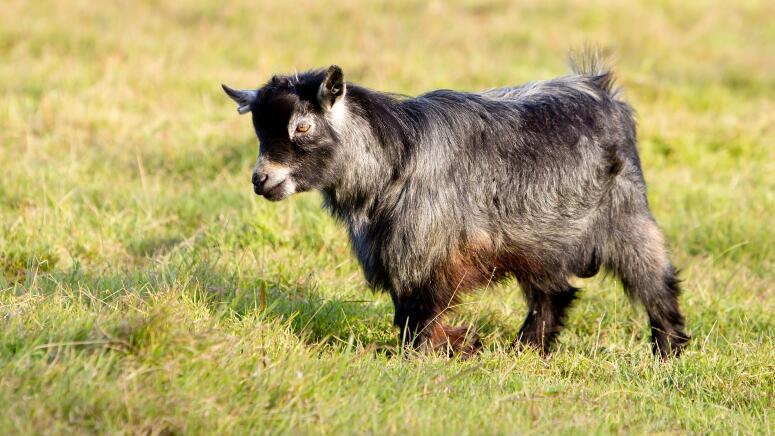
Pygmy Goats
Pygmy goats are small in stature, comical and densely found across the US. Pygmy goats are actually documented as a meat breed, although I do find they are sometimes crossed and used as a dairy breed.
Traditionally, Pygmy goats are very good browsers and used often in a pasture rotation setting with other animals.
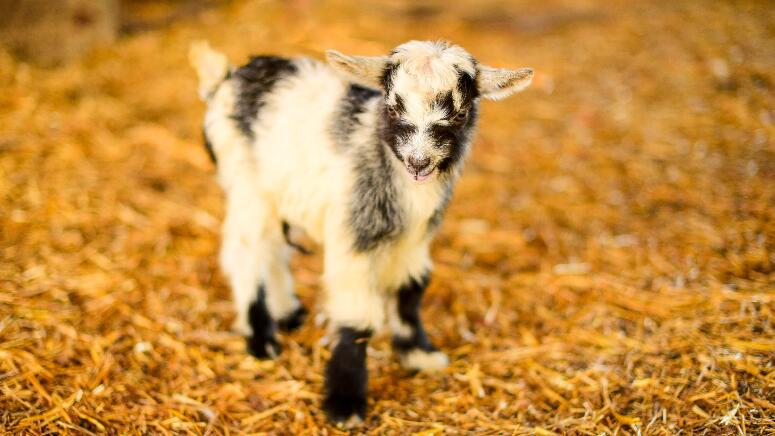
Nigerian Dwarf Goats
Nigerian Dwarf goats are similar in size to the Pygmy, maybe reaching on average 40lbs. They have a more slender appearance and are a very well known dairy goat breed. Widely popular on small farms and homesteads. With their small size, sought after butterfat percentage and amazing milk potential they make a great addition. Nigeria Dwarf goats hold a butterfat percentage that is on average 6-10%!
*** Did You Know? Butterfat is the fat content found in milk, and is particularly important when it comes to cheese making.
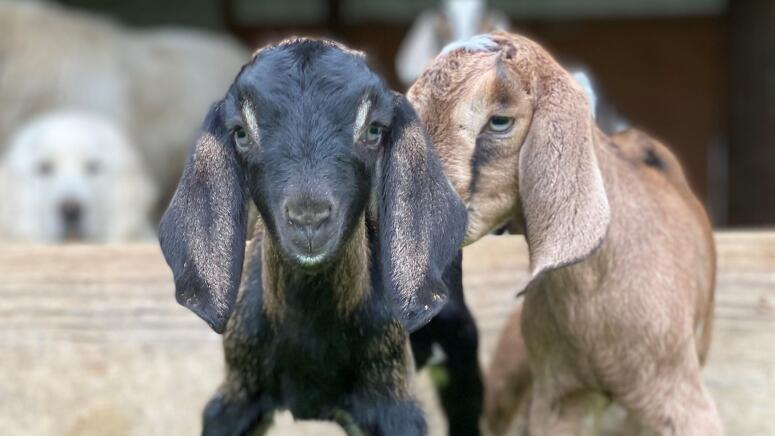
Nubian Goats
Last but not least, Nubian goats. Most often only used as a dairy breed, well known for their long ears and Roman noses, Nubians are quite social and incredible milk producers. Nubians have an on average 5% butterfat content in their milk.
Nubians are known for being outgoing and a tad loud. They are the largest of the three breeds we are highlighting, and do require a bit more space.
No matter what breed you choose, please know that goats are so much fun and great providers to a farm or homestead.
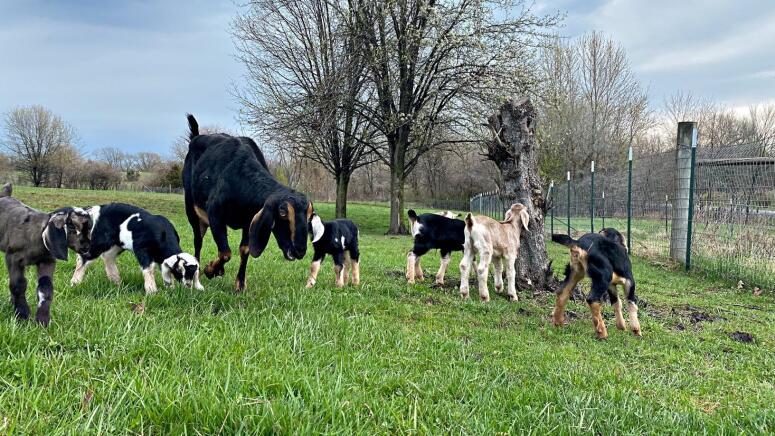
How to Raise Goats
Goats are not as high maintenance as they are made to seem, or sometimes seem themselves. They just need a few things in order to live a happy, healthy, and productive life with you. Shelter and nutrition are key to successfully raising goats.
Shelter
Goats really don’t care to get wet. If you take a drive through the country you will see cattle standing out in a rainstorm, happy as can be. Think the exact opposite for goats! You will need a dry place in which they can escape from any type of weather.
The same structure can provide both shelter from storms and shade during the summer months. Goats need a bare minimum of 20 square feet of inside space and 200 square feet of pasture space per goat. The larger the space the better, plus then there is always room to add more goats if you wish!
Keep that in mind when thinking about how many goats you are itching to bring home. This is very important for not only the overall health of the animal, but also their nutritional requirements.
It is also noteworthy to mention that having too much space for them will require more work on your part, remember, they are browsers not grazers.
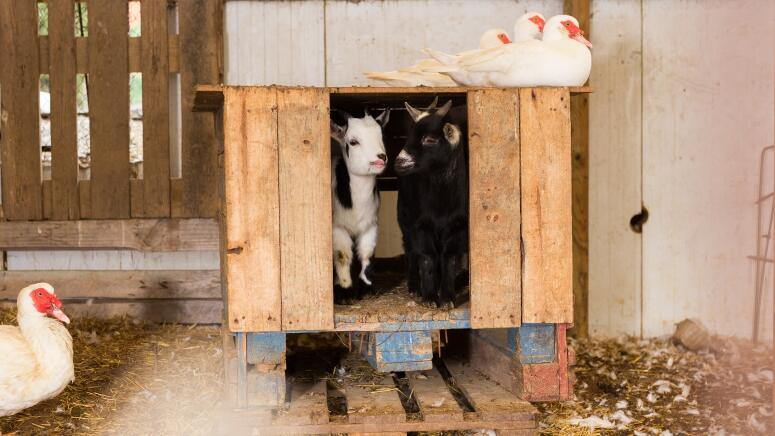
Nutrition
In regards to nutrition, this will vary slightly depending on sex of the goat and if the doe is lactating or pregnant. Bucks and wethers (castrated male goats) don’t require much of any when it comes to grain requirements. In fact, they can have health issues if fed too much grain.
Goats do very well on pasture or when fed hay, and this should be 90% of their diet on average. Lactating or pregnant does can be fed an appropriate goat feed ration daily to maintain body condition, but a vast majority of their diet must also remain forage/hay/pasture as well.
Don’t forget the minerals and salt block! We now as an industry have goat-formulated everything, to take the worry and hassle out of you having to go down each isle to find the right products.
For those who are asking, goats do like some treats! Again, there are those commercially made specifically for goats, but my goats also enjoy a good carrot or apple as well! If you really want to treat the goats bring a box of Cheerios to the feed bunk.
Fencing
Goats browse for food. Unlike their counterparts, sheep, they forage through the trees and bushes for things to snack on—meaning they like to climb on things to get that one leaf that must taste better than the fallen leaf on the ground.
My fencing suggestions are cattle panels or strong woven wire fencing. Both are exceptional options and should hold the weight of the goat if (when) they choose to go for those top leaves along the fence line.
If you find that the goats are climbing too much, and you are always mending fence lines, they do respect a couple of hot wire strands. This will keep them from climbing and rubbing on the fences. I can’t stress this enough—if you learn only one thing from this, I hope it’s that you need adequate fencing.
More Tips
Earlier I touched on spacing requirements and the fact that goats are browsers, both of which are important to understanding their nutritional needs. There are many feed choices, hay options, and supplement options and no shortage of opinions on what we should be feeding our goats. I suggest that you do what is best for you and your animals.
Owning goats is mutually beneficial! A good-quality loose mineral (or mineral block), quality hay, and supplemental grain, when needed, will keep your goats healthy and you happy. Of course, differing climates, deficiencies in the animal and any random miscellaneous occurrences that arise will challenge you to make some changes to their diet.
Circling back, this is where entrusting someone experienced who has “been there” will come in handy. For example, I let my goats eat on pasture for as long as they can before winter. It is great for their diets and great for my pocketbook.
Final Word
Raising goats in any capacity is so enjoyable—not even kidding (see what I did there!). They have quirks and mannerisms that I have never experienced with any other animal I have raised. You wont regret this choice to add a couple of goats to the homestead/farm.
Author Profile: Mandi Chamberlain
Hi everyone! My name is Mandi. I am a registered veterinary nurse, who fell in love with the art of living slow so I moved to the country. Most who know me would say I do anything but live slow these days though! I live on just over 4 acres in the Midwest. I raise a herd of registered Nubian dairy goats, a tribe of chickens, and a large garden.
I have a huge passion for learning, and then teaching others what I have learned. I find country life to be rewarding and challenging every single day, but I wouldn't trade a thing. Thanks for joining me! I am here to help with anything!
More Blogs by Mandi Chamberlain
- https://www.mannapro.com/homestead/beginners-guide-to-raising-goats
- https://www.mannapro.com/homestead/raising-goats
- https://www.mannapro.com/homestead/homestead-now-more-than-ever
Feature Products

